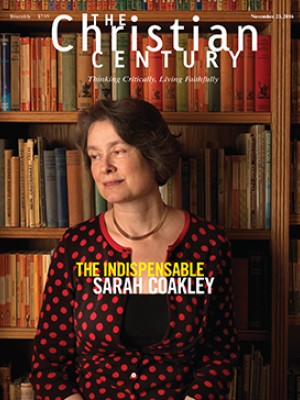Rachel Azaria works for balance in Israel's religious conflicts
Rachel Azaria’s office is sparsely but intentionally decorated with a Hebrew translation of Martin Luther King Jr.’s biography and a framed photo of her role model, Hillary Clinton.
Before she became a member of the Knesset, Israel’s parliament, Azaria spent her childhood shuttling between the United States and Israel. This has led her to try to quell the conflicts between American and Israeli Jews over questions of religious practice.
Azaria, 38, adapts her Orthodox Judaism to Israeli secular life. Since March 2015, she has represented the center-left Kulanu party and has been described as the only member of Israel’s 66-member coalition government willing to challenge the ultra-Orthodox monopoly in determining family rights issues and issues of religion and state.
Read our latest issue or browse back issues.
She led efforts in July to temper a bill that would have given the Chief Rabbinate, which stringently interprets Jewish law, unbridled authority over mikvahs, or ritual baths.
But with respect to the not-yet-implemented vote in January to create an egalitarian prayer space next to the Western Wall, Azaria hopes American Jews can understand that Israelis are still “figuring out” what it means to live in a Jewish state.
“I know Reform and Conservative leaders have no more patience,” Azaria said after the liberal Jewish leaders recently threatened to rescind support for Israel over the delay.
This year, crises also erupted over the Chief Rabbinate’s refusal to recognize conversions that were authorized by several mainstream American Orthodox rabbis, including Gedalia Dov Schwartz, the head of the council that oversees Orthodox conversions in America.
Azaria sees the controversies as symptoms of a country that hasn’t had time to embrace a joint civil vision.
“When the state was founded, its leaders let the ultra-Orthodox handle issues of religion while they dealt with wars and building the economy,” Azaria said. “Determining who we are and what we stand for is this generation’s task.”
She described Israel’s battle over religion and state as a “civil war of words.”
Israeli president Reuven Rivlin has said that modern Israel is dominated by four groups: ultra-Orthodox, secular Jews, national-religious Jews, and Arab Israelis. Azaria said that for Israel’s first 65 years, each of these groups thought they would ultimately grow enough to trample their competitors and set the state agenda.
“All these groups are starting to realize they are not going to take over,” Azaria said. “This is the first stage.”
The way she sees it, the state’s Jewishness evolved naturally and is interwoven into society.
“Anything not divisive we figured out; now there are conflicts,” she said.
Azaria believes in working from within the system. Despite its center-left positions, her party joined Prime Minister Benjamin Netanyahu’s right-wing government coalition, and she believes she can accomplish much more than opposition lawmakers by learning to “play the game” inside the coalition.
Tehila Nachalon, a religious feminist activist who has worked alongside Azaria for 15 years, said Israel’s conflict is not between the ultra-Orthodox and other Jewish people.
“It’s a fight against extremism,” Nachalon said.
She said having Azaria in the Knesset has greatly helped the cause of religious equality.
“There are few others like Rachel, certainly no other women,” she said. —Religion News Service





